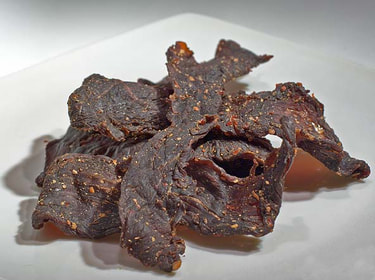 Some of my beef jerky. Some of my beef jerky. This last summer, I (JF) made beef jerky for the first time. Not only is dried meat delicious, but it's fascinating because it's a way to preserve meat without requiring refrigeration. To me, that's absolute witch science: all my life I've been told that meat spoils quickly and, while food safety is important, there's a lot of wiggle room and interesting options for preserving meat without refrigeration. Here's the basics: Bacteria that spoil food are kind of like humans--they don't like it too hot, they don't like it too cold, they need air to breathe, something to feed on, and a little bit of water. If you want to inhibit the growth of these food-spoiling bacteria, you need to manipulate one or more of these variables and deprive them of what they need to live. Temperature is the most common: if you buy hamburger patties from the store, you'll refrigerate them to slow down bacterial growth, then throw it on the grill to kill any bacteria with heat. The magic of dehydration is that it deprives the bacteria of moisture, removing the urgent need to cook or chill the meat (so, more like bacteria famine than the bacteria ice age in the freezer or bacteria genocide on the grill). So, how to remove that moisture? The two most common tools are heat and air movement. The two combined are especially effective (which is why most food dehydrators have a fan). Although the USDA recommends heating beef to 160 degrees Fahrenheit to kill bacteria, it's more typical to dry it between 130 and 160 degrees (cooking a steak to 130-140 degrees F internal temperature is rare). Heat and air movement are such simple ingredients that you'll soon realize you may not need a "real" food dehydrator: you can dry out meet in an oven, over a fire, in a solar cooker, or just out in the sun. Or maybe, in a car on a hot day… There are still food safety risks even after drying. Remember, drying doesn't kill bacteria, it only inhibits their growth. There may still be dangerous bacteria on the meat before or after drying, and the growth of that bacteria will accelerate if you leave your dried jerky in a warm, moist, or oxygen-rich environment. Remember, the danger zone for food spoilage is 40-140 degrees Fahrenheit. So, it also goes without saying that any meat drying or processing is a thing you do at your own risk. To me, though, that's one of the coolest things about making beef jerky: You take responsibility into your own hands. Can you do that badly? Of course. But to me it's definitely worth it--especially because beef jerky is so delicious. Plus, it makes you a master of beef jerky witch science.
2 Comments
Isaiah
1/22/2020 08:50:28 pm
Do you marinate or season your meat before drying it? If so what recipe do you use?
Reply
7/28/2023 08:58:31 am
It's great that you discussed that beef jerky is a good option to avoid food spoilage. My friend wants to try beef jerky. I should advise him to turn to a family business that produces quality jerky.
Reply
Leave a Reply. |
 RSS Feed
RSS Feed
